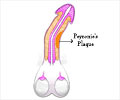Experiments on fruit flies have revealed that over-expression of an enzyme in the brain can reduce the telltale deposits causally linked with Alzheimer's disease, say US scientists.
US researchers indicated that recent experiments on fruit flies have revealed that over-expression of an enzyme in the brain can reduce the deposits linked with Alzheimer's disease.
Dr. Yi Zhong, a professor at Cold Spring Harbor Laboratory (CSHL) whose lab studies genetic mechanisms involved in neurodegenerative illnesses, engineered fruit flies to express a human gene that codes for the production of an enzyme called neprilysin (NEP).Previous studies have shown that NEP enzymes degrade protein deposits in the brain that are characteristic of Alzheimer's.
The protein clumps, sheet-like plaques between brain cells called beta amyloid deposits, have been found in the autopsied brains of human Alzheimer's patients. wo types of beta amyloid sheets are associated with Alzheimer's plaques. Scientists suspect that the so-called Aß42 plaques, structurally composed of 42-amino acid beta amyloid peptides, are involved in the genesis of the illness.
"But the mechanism by which Aß42 reaches pathological levels in the brains of late-onset patients is not well understood," Dr. Zhong said.
Experiments on transgenic fruit flies showed the research team that by over-expressing human NEP in fly neurons, accumulation of Aß42 inside the neurons was reduced.
The researchers also found that outright death of neurons due to Aß42 plaques was suppressed.
Advertisement
It was also found to shorten the lifespan of the flies.
Advertisement
The researchers wants to test whether the life-shortening impact of NEP over-expression upon CREB occurs in transgenic mammals, such as mice, which are genetically closer to humans than flies.
"We have succeeded in demonstrating both protective and detrimental aspects of high NEP activity in the fly brain. We also noted a reduction of NEP activity in fly brains that correlates with age. These are intriguing clues about mechanisms that contribute to the causation of Alzheimer's," Dr. Zhong said.
"We must now seek additional knowledge about the physiological mechanisms that underlie age-dependent downregulation of NEP in flies. This is a powerful genetic model system that we hope will lead us to discover novel therapeutics to combat Alzheimer's, a disease that devastates so many people every year," the researcher added.
Source-ANI
RAS/L














